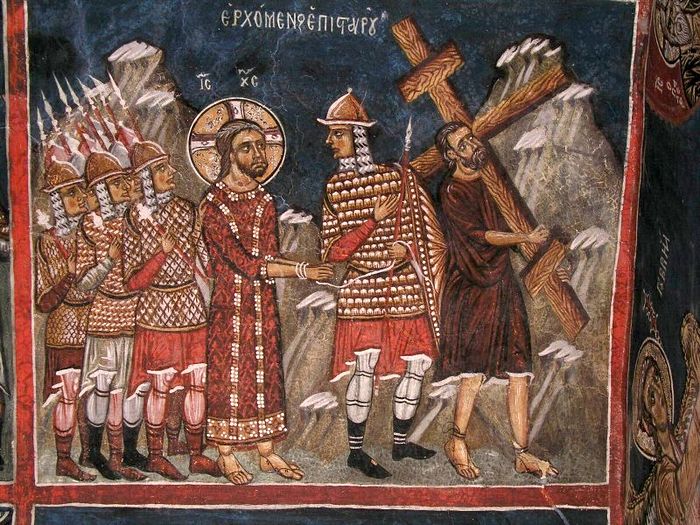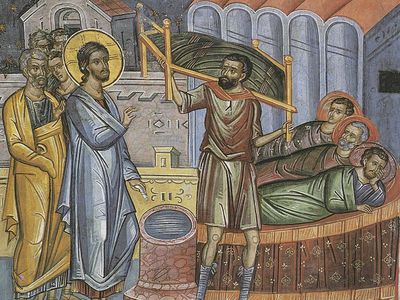There is no living knowledge of Christ without the cross.
—St. Ignatius (Brianchaninov)Ignatius (Brianchaninov), bishop of the Caucasus and Stavropol, St.
“>St. Ignatius (Brianchininov)
Whosoever will come after me, let him deny himself, and take up his cross, and follow me (Mk. 8:34). We cannot follow after Christ, Who carried the Cross to Golgotha, without the cross; and all who follow after Him will definitely have to walk with the cross.
 Great Friday. Simon the Cyrenean helps the Lord carry the Cross. A fresco in Cyprus
Great Friday. Simon the Cyrenean helps the Lord carry the Cross. A fresco in Cyprus
What is this cross? It is all manner of inconvenience, hardships and sorrow, placed on us from without and within on the path of conscientious fulfillment of the Lord’s commandments, in the life and spirit of His prescriptions and requirements. This cross has grown to be such an inextricable part of the Christian that wherever there is a Christian, there is this cross; and where there is no cross, there is no Christian. All-around preferentiality and a life of comfort is not what a Christian needs. His task is to purify and correct himself. He is like a sick person who needs cauterization here, incision there—and how is this supposed to happen without pain? So, rejoice when you feel a cross on you, for this is a sign that you are following after the Lord on the path of salvation, to paradise. Have a little patience. The end and crown are near!
—St. Theophan the RecluseTheophan, the Recluse, St.
“>St. Theophan the Recluse
On carrying the cross
We must understand that the Lord does not force us to carry His Cross—that is, to endure the sufferings that He endured for our sake. He does not say, “Whosoever will come after Me let him take up My cross,” but rather each should take up his own cross (Matt. 16:24). For our Lord knows that we cannot carry His cross, while we can carry our own cross, with His help.
—St. Dimitry of RostovDimitry of Rostov, St.
“>St. Dimitry of Rostov
And this Cross was not so heavy for Him as it was relieving and saving for us. His burden is our rest; His labors, our reward; His sweat, our relief; His tears, our cleansing; His wounds, our healing; His suffering, our consolation; His Blood, our redemption; His Cross, our entrance into paradise; His death, our life.
—Metropolitan Platon (Levshin)Platon (Levshin), Metropolitan
“>Metropolitan Platon of Moscow
Our cross consists in the fear of the Lord. Just as one who is crucified cannot move around as he pleases, so we also must direct our will and desires not toward what is pleasing to us or our passions, but to what is in accordance with the law of the Lord, with Whom we are co-crucified. And just as the one nailed to the cross does not think of the present or of the objects of his former passions, does not worry about the morrow, does not desire possessions, does not boast, does not argue, is not jealous, does not grieve over the present, does not remember past offenses, but counts himself as dead to all things earthly and thinks only of where he shall go in a few moments—so too must we, having been nailed to the fear of God, die to everything—not only to worldly vices, but to all things worldly, and direct all our attention to that place where we may be transferred at any moment. For in this way we can mortify all our passions and fleshly lusts.
— St. John CassianJohn Cassian, Saint
“>St. John Cassian the Roman
Every person has his own cross, and when a servant of Christ, for the sake of love for God, patiently bears his cross, he partakes of the Lord’s suffering, and his cross becomes conformed to the Cross of the Lord. And our Lord regards our sufferings as His own. Just as He said to those who do good: Inasmuch as ye have done it unto one of the least of these my brethren, ye have done it unto me (Matt. 25:40), so also concerning those who wrong us, He says to the offenders: Inasmuch as ye did it not to one of the least of these, ye did it not to me (Matt. 25:45).
For the Lord suffers in us, as in His own members; and we who suffer, as though gathering crumbs left from the heavenly table, collect certain remnants of the Lord’s sufferings, according to the words of the Apostle:
Who now rejoice in my sufferings for you, and fill up that which is behind of the afflictions of Christ in my flesh (Col. 1:24).
—St. Dimitry of RostovDimitry of Rostov, St.
“>St. Dimitry of Rostov
Our Cross, and the Cross of Christ
The Lord said to His disciples, If any man will come after me, let him deny himself, and take up his cross, and follow me (Mt. 16:24).
What does his cross mean? Why is his [our] cross, that is, the separate cross of each person, called also the Cross of Christ?
Our cross: It is sorrows and suffering in this earthly life, and everyone has his own.
Our cross: It is fasting, vigils, and other pious ascetic labors by which the flesh is humbled and placed in submission to the spirit. These labors should correspond to each one’s strength, and everyone has his own.
Our cross: It is sinful infirmities and passions, and every person has his own! Some of them we are born with, while others we are infected with on the path of our earthly life.
The Cross of Christ is Christ’s teaching. Our Cross, and the Cross of ChristOur cross is vain and barren, no matter how heavy it may be, if it is not transformed into the Cross of Christ by our following Christ.
Our Cross, and the Cross of ChristOur cross is vain and barren, no matter how heavy it may be, if it is not transformed into the Cross of Christ by our following Christ.
“>1
Our cross is vain and barren, no matter how heavy it may be, if it is not transformed into the Cross of Christ by our following Christ.
For the disciple of Christ, his own cross becomes the Cross of Christ, because the disciple of Christ is firmly convinced that Christ unsleepingly keeps vigil over him, that Christ allows him to have sorrows as the necessary and inescapable condition for Christianity, that no sorrow could come close to him if it had not been allowed by Christ, that through sorrows a Christian is assimilated into Christ, becoming a partaker of His lot on earth, and later also in heaven.
For the disciple of Christ, his own cross becomes the Cross of Christ, because the true disciple of Christ honors the fulfillment of Christ’s commandments as the only goal of his life. These all-holy commandments become a cross for him, on which he continually crucifies his old man with its passions and lusts (cf. Gal. 5:24).
From this it is clear why, in order to accept the cross, we must first deny ourselves even to the depths of our souls.
 Sin is DestructiveDeath, infirmity, temporality and susceptibility to passions entered this world with the sin; they are interwoven. Sin destroys everything in a man, both his body and his soul. Any doctor is perfectly aware of it.
Sin is DestructiveDeath, infirmity, temporality and susceptibility to passions entered this world with the sin; they are interwoven. Sin destroys everything in a man, both his body and his soul. Any doctor is perfectly aware of it.
“>Sin has mingled so powerfully and a profusely into our fallen nature that the Word of God does not cease calling it the soul of fallen man.
In order to take our cross upon our shoulders, we must first deny the body its lustful desires, leaving to it only what is necessary for existence. We must recognize our “righteousness” as the cruelest unrighteousness before God, our reasoning as completely unreasonable, and finally, having given ourselves to God with all the strength of our faith, we must commit ourselves to the ceaseless study of the Gospel, and renounce our own will.
Whoever has made this renunciation of himself is able to accept is own cross. With submission to God, calling out for God’s help to strengthen him is his weakness, he looks without fear or confusion at an approaching sorrow, and prepares himself to bear it magnanimously and courageously. He has hope that through it he will become a partaker of Christ’s sufferings, and attain to the mystical confession of Christ not only with his mind and heart, but also in very deed, by his very life.
The cross is only burdensome as long as it is our own cross. When it is transformed into the Cross of Christ, it takes on an extraordinary lightness, For my yoke is easy, and my burden is light (Matt. 11:30), said the Lord.
The cross is placed upon the shoulders of the disciple of Christ when that disciple recognizes himself as worthy of the sorrows sent down to him by Divine Providence.
The disciple of Christ correctly carries his own cross when he recognizes that those very sorrows sent down to him, and no others, are necessary for his upbringing in Christ and salvation.
Our patient carrying of our own cross is the true vision and awareness of our own sin. There is no self-deception at all in this awareness. But whoever recognizes himself to be a sinner, yet at the same time complains and cries out from his cross, simply proves that he is only flattering himself with a superficial awareness of his sin, and thus deceives himself.
Patiently bearing one’s own cross is true repentance.
O you who are crucified on the cross! Know Christ—and the gates of heaven will open to you.
Laud the Lord from your cross, turning away all thoughts of complaint and murmuring, rejecting them as criminal and blasphemous.
Thank the Lord from your  On the Veneration of the CrossEvery action, therefore, and performance of miracles by Christ are most great and divine and marvelous: but the most marvelous of all is His precious Cross.
On the Veneration of the CrossEvery action, therefore, and performance of miracles by Christ are most great and divine and marvelous: but the most marvelous of all is His precious Cross.
“>cross for this priceless gift, for your cross, for your precious plight, for the opportunity to imitate Christ through your sufferings.
Theologize from your cross, because the cross is the real and only school, treasure house, and throne of true theology. Without the cross there is no living knowledge of Christ.
Do not seek Christian perfection in human virtues. It is not there; it is hidden in the Cross of Christ. Our Cross, and the Cross of ChristOur cross is vain and barren, no matter how heavy it may be, if it is not transformed into the Cross of Christ by our following Christ.
Our Cross, and the Cross of ChristOur cross is vain and barren, no matter how heavy it may be, if it is not transformed into the Cross of Christ by our following Christ.
“>2
Your own cross changes into the Cross of Christ when as a disciple of Christ, you carry it with an active awareness of your sinfulness—which requires punishment—when you carry it with gratitude to Christ, and laudation of Christ. From praise and gratitude, spiritual consolation appears to the sufferer; gratitude and praise become an over-abundant source of ineffable, incorruptible joy that bubbles with grace in the heart, pours over the soul, and even onto the body itself.
By its outward appearance alone, to fleshly eyes, the Cross of Christ is a cruel place. For the disciple and follower of Christ it is the place of supreme spiritual delight. So great is this delight that sorrow is quite muted by delight, and the follower of Christ feels only delight amidst the harshest languishing.
The young Maura said to her young husband Timothy, who was enduring terrible torments and inviting her to take part in that martyrdom, “I fear, my brother, that I might become affrighted when I see the terrible torments and the wrathful hegemon, that because of my young age I might not have the strength to endure.” The martyr replied, “Hope in our Lord Jesus Christ, and the torments will be as the oil of gladness pouring over your body, and the spirit of dew over your bones, relieving all your pains.”
The cross is the strength and glory of all the saints from the ages.
The cross is the healer of passions, and the destroyer of demons.
The cross is death-bearing to those who have not transformed their own crosses into the Cross of Christ; who murmur against Divine Providence, blaspheme it, and give themselves over to hopelessness and despair. The sinners on their crosses who do not recognize and repent of their sins die an eternal death, losing by their impatience true life, life in God. They are taken down from their crosses only to descend in soul to an eternal grave—the dark dungeons of hell.
The Cross of Christ lifts from the earth Christ’s disciple crucified on it. The disciple of Christ, crucified on his cross, contemplates the heights, lives in mind and heart in heaven, and beholds the mystery of the Spirit in Christ Jesus our Lord.
If any man will come after me, says the Lord, let him deny himself, and take up his cross daily, and follow me. Amen.
—From Volume 1 of Ascetical Experience.
St. Ignatius (Brianchaninov)Ignatius (Brianchaninov), bishop of the Caucasus and Stavropol, St.
“>St. Ignatius (Brianchaninov)
